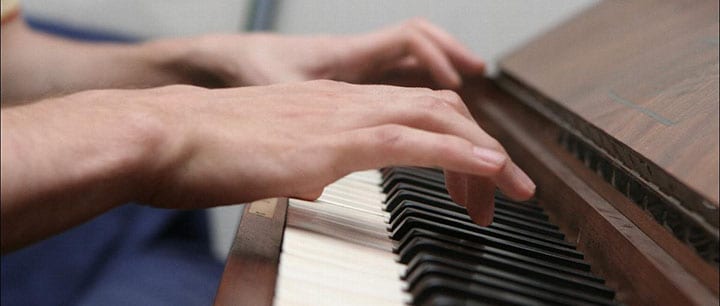 What do all of the best piano players in the world have in common? If you take a close look at what they’re doing, you’ll find a handful of similarities. All of them have incredible work ethic, attention to detail, and practice diligently everyday. On top of that, the best piano players in the world have studied with private instructors for years, taking advantage of an experienced player’s point of view.
What do all of the best piano players in the world have in common? If you take a close look at what they’re doing, you’ll find a handful of similarities. All of them have incredible work ethic, attention to detail, and practice diligently everyday. On top of that, the best piano players in the world have studied with private instructors for years, taking advantage of an experienced player’s point of view.
All of these qualities of the best piano players are interrelated. It’s hard to practice diligently on a daily basis without having the work ethic to focus on the task at hand. And without attention to detail, diligent practice is almost always inefficient. Studying with a private instructor can help you stay focused, which aids in your attention to detail, and in turn keeps you motivated, which helps your work ethic. As an aspiring piano player at any level, these qualities can be learned and acquired.
Whether you view piano playing as a hobby that you do in your spare time, or a career path to performance on the world stage, these qualities should be carefully examined. As a casual piano player, maintaining all of these personal attributes can help you get better with minimal frustration. And as an up-and-coming maestro, efficient use of practice time can keep you moving forward and playing at your best!
1. Excellent Work Ethic
Every single piano player knows what it’s like to face challenges. What separates the best piano players from the rest of us is that they persevere through these challenges. Having the personal fortitude and work ethic to look at any difficult passage, and practice it until it’s perfect, is an attribute that you can learn, but will need to be cognizant of every day.
Work ethic doesn’t just stop with piano playing. It requires you to be focused on your work around the clock. Whether you’re a student or have a full-time career, make sure that your other obligations are taken care of to give you enough time to practice often.
2. Attention to Detail
Paying close attention to detail goes hand in hand with having a great work ethic. As you will need to be able to perfect those difficult passages and tiny issues with your piano playing after recognizing them, it does no good to have a fine-toothed comb and find small mistakes without the work ethic to fix it.
All of the best piano players are able to recognize the small intricacies of each passage on their own, and correct mistakes as they arise with diligent practice. If your experience level is not quite at the same point as professional pianists, this is where working with a private piano teacher is important!
3. Diligence
All of the best piano players realize that without consistent practice, their piano playing will not improve. Along with practicing, they play with a purpose. When practicing scales and arpeggios, they connect the work with the pieces that they are currently playing. Everything they do during each practice session has a distinct reason, and they focus on that. Without a purpose, the exercises and drills can easily become sloppy.
Along with the exercises prior to playing each piece, the best piano players focus intensely on each passage within the piece itself. Going back to the first two qualities, each piece requires incredible attention to detail, to make sure that the difficult passages are perfect, and if not, the work ethic required to make them perfect comes into play.
4. Commitment
You might think that the best piano players in the world had no need to have any private instruction to achieve greatness. That couldn’t be further from the truth. Every great musician, whether pianist or otherwise, has committed to studying with highly revered instructors prior to becoming who they are today. Private instructors can help to mentor you as a musician, and help you recognize the small details that you might overlook on your own.
Taking a private lesson on a weekly basis can help refresh your piano playing, and give you a second set of eyes and ears to make sure that your diligent practice isn’t going to waste. A private instructor can also help keep you motivated with different pieces that highlight your strengths, as well as work on your weaknesses.
5. Eagerness to Learn
In order to be a good piano student, you have to really want to learn how to play the piano! While this may seem painfully obvious, it is actually a very important trait. As with mastering most skills, learning to play the piano requires a great investment of your time. You need a true desire to learn piano that will keep you motivated through the hours of weekly practice you will need.
In addition to learning how to physically play the piano, you will also need to learn how to read music. In the beginning, you may only be able to read one clef at a time, but as you grow more comfortable with reading music, you will start to read them simultaneously — with the treble clef indicating what you should play with your right hand and the bass clef for your left. You will also need to memorize a vocabulary of musical terms that indicate the volume, speed, and other features of the music.
6. Willingness to Practice
A book sitting on your bookshelf does you no good unless you open the cover and read the words. Likewise, having access to a piano does nothing unless you are actually willing and committed to sitting down and practicing it regularly. Simply attending a piano lesson each week is not enough to master the skill of playing the piano. If you’re not revisiting the material your piano teacher taught you between lessons, you will likely forget much of what you have learned. Playing the piano also requires a great deal of muscle memory in your fingers, which can only be developed with regular practice over time.
7. Dedication
Although it has already been mentioned, it is worth repeating — the ability to learn piano requires a lot of time and practice. While you may have images in your head of a concert pianist performing an exhilarating piece by Beethoven or Chopin without breaking a sweat, this effortless performance is the result of many years of dedicated practice. In the beginning, you might struggle to even pick out simple melodies. There is no shame in being a beginner, but it’s important to realize that you will need to run a lot of drills, scales, and exercises to learn piano techniques that will lead you to more complicated pieces of music. At times, you may feel as though your practice is going nowhere and your abilities do not seem to be improving. Although you may want to give up, this is the best time to persevere!
With time, practice, and these qualities, almost anyone can learn piano. So what are you waiting for? There’s no better time than the present to start taking lessons and developing your skills.
Photo by Philipp Bunge
Megan L.

